what to do with a cognitive science major
![]()
Imagine performing deep-tissue, in vivo functional encephalon imaging at the level of subcellular resolution
Imagine developing tiny implantable electronic devices that could communicate nerve signals to human organs when natural connections have been damaged.
Imagine building tools that are powerful plenty to brainstorm to map the brain'southward i,000,000,000,000,000 neural connections.
These listen-bending brain innovations aren't science-fiction, they're science fact; they represent just a small slice of the current cutting border of neuroscience. The human being encephalon is truly the almost complex individual structure in the known universe. At this moment in history, we are just outset to be able to apply our brains to understand our brains. This is what the challenging, exciting, and fast-growing field of neuroscience is all almost.
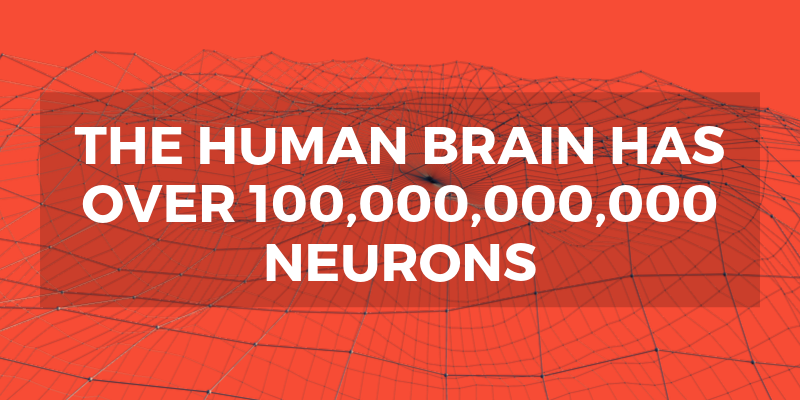
If you're innovative, analytical, and ambitions, you lot may want to push button the limits of homo understanding by pursuing a career in brain inquiry. Information technology all starts with a degree in neuroscience. But in that location are plenty of steps along the way, and lots of considerations to accept into business relationship, from specialization to career path. Read on to acquire all about degrees and jobs in the cutting-edge field of neuroscience.
Jump To:
- What is Neuroscience?
- How is Neuroscience Different from Neurology?
- What Types of Neuroscience Are There?
- How do I Get a Neuroscientist?
- What Classes will I Take for a Caste in Neuroscience?
- Where Can I Work with a Neuroscience Degree?
- What is the Task Market with a Neuroscience Degree?
What is Neuroscience?
Neuroscience (AKA neurobiology) is the scientific study of the brain and peripheral nervous system. Neuroscience is a branch of biological science that is distinctly multidisciplinary in its approach to understanding the complexities of neurons and neural circuits. Neuroscience incorporates studies in such disciplines as:
- anatomy
- physiology
- psychology
- molecular biological science
- cytology
- developmental biology
- mathematical modeling
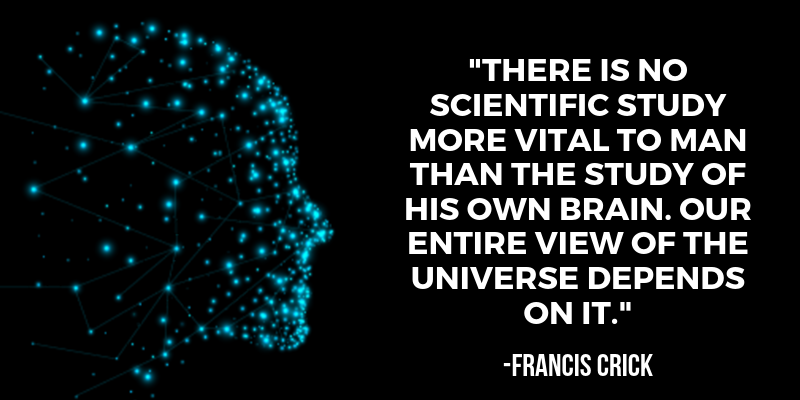
Neurologists seek to sympathize how the nervous system works, the part of the unlike structures and systems that brand upwards the brain. They study how the encephalon performs cognitive tasks and the biological basis for them, including functions like:
- learning
- memory
- behavior
- regulation
- bear on
- movement
- perception
- consciousness
Measurement, observation, analysis, and fifty-fifty philosophy all come into play in the field of neuroscience. Neuroscientists may study minute structures similar the tiny dendrites of neurons, or probe big questions such as how the encephalon creates consciousness. They also frequently examine the many bug with health and evolution that tin exists in brains and the remainder of the nervous organization, including:
- Alzheimer's
- traumatic brain injury
- Parkinson's
- Down syndrome
- ADHD
- addiction
- encephalon tumors
- schizophrenia
Neuroscientists tin provide a tremendously important human service with their work. As clinical researchers of human diseases and syndromes, neuroscientists have the capacity to make vital improvements in people'south lives. Enquiry into how the brain develops, functions, and changes can class the footing for new drugs, interventions, and therapies that tin extend and improve the lives of people affected by debilitating and even life-threatening conditions.
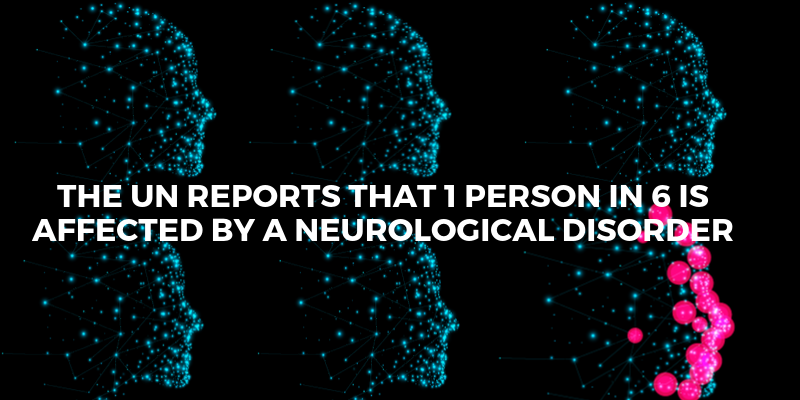
How is Neuroscience Unlike from Neurology
If you're interested in the mysteries and conundrums of the homo brain, you're in luck. Both the field of neuroscience and the field of neurology will allow y'all to spend your days investigating brain health and brain disorders, and permit you to amend people's lives. And so what'due south the departure between neuroscience and neurology?
There are few ways these two fields diverge, but the main difference betwixt neuroscience and neurology is focus: research vs clinical exercise. Neurologists diagnose and care for patients affected past neurological weather such as ALS, Parkinson's, hydrocephaly, and brain tumors. Neurologists, substantially, are doctors of the brain; they work in clinical settings such as hospitals and are tasked with direct patient care. They may work closely with, or brand referrals to, neurosurgeons, another closely related occupation.
To go a neurologist, a student must earn an undergraduate degree in pre-med or a related field like physiology. They will then demand to pass the MCAT, get through four years of medical school, and spend another year in an internship and iv years in residency. This is oft filled by a fellowship, and finally board certification as a neurologist.
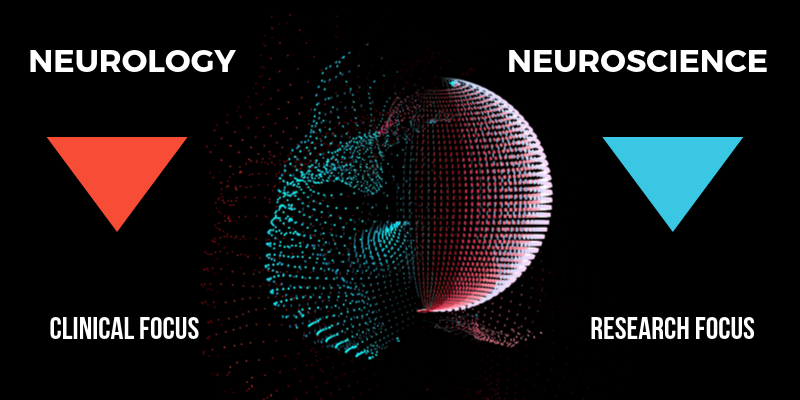
Neuroscientists also bargain with people and the brain, but normally exercise so fun a purely enquiry function. They frequently collaborate with people who have ALS, Parkinson's, hydrocephaly, encephalon tumors, and other neurological conditions, but usually do then every bit role of clinical trials, empirical research, or field-based observations. They typically piece of work in labs and offices instead of hospitals and clinics. Neuroscientists generate new findings that increase our understanding of the human brain. They likewise investigate and develop treatments for conditions of the encephalon and nervous system- the very same tools and treatments that neurologists may apply in their clinical practice.
Unlike neurologists, neuroscientists do non demand a medical degree in order to practice. The path to becoming a neuroscientist involves an undergraduate degree in neuroscience (or a related field), an optional main'due south degree in neuroscience, and a PhD in neuroscience. As with neurology, this is typically followed by a fellowship.
What Types of Neuroscience Are There?
Neuroscience has been effectually for a very curt time compared to other medical sciences, but information technology's evolving fast, and there are a vast number of niche fields. As a neuroscientist, you can specialize in highly specialized areas like:
- Neuroendocrinology
- Electrophysiology
- Neuropharmacology
- Neurolinguistics
- Neuroinformatics
New specialization and sub-specializations are always developing as the field continues to abound. Simply, broadly speaking, the field of neuroscience tin be divided into iv main branches: Behavioral neuroscience, Cognitive neuroscience, Computational neuroscience, and Developmental neuroscience. All of these are highly interdisciplinary, and may have a high degree of overlap in their applications.
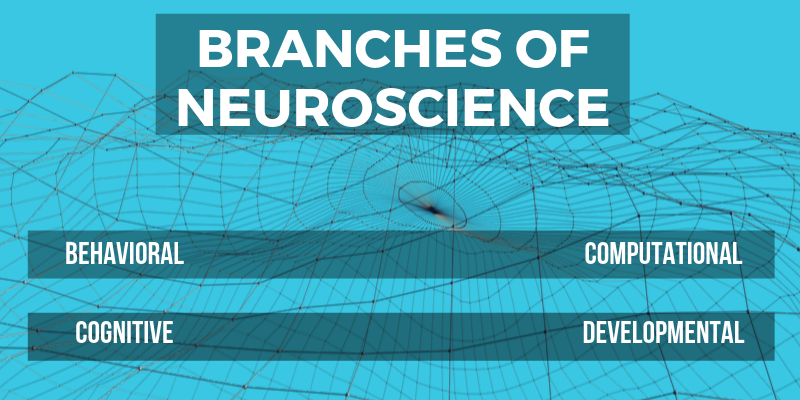
Behavioral neuroscience is the study of how the brain directs behavior. This includes areas like decision-making, language production, move, and socialization. It is sometimes referred to as biological psychology, biopsychology, or psychobiology.
Cognitive neuroscience investigates how the brain forms and experiences thoughts from a structural and functional perspective. This includes topics like how memory recall takes place in the brain. Researchers in this field may measure out subjects' brain activity while performing various tasks. Cognitive neuroscience integrates principles of cognitive psychology and psychiatry.
Computational neuroscience investigates how the brain computes. Researchers in this field of neuroscience utilise computer simulations and models to understand encephalon functions. This field integrates aspects of mathematics, physics, programming, AI, and other and other computational disciplines.
Developmental neuroscience is the written report of how the brain and nervous system develop, grow, and regenerate or degenerate beyond the lifespan, with a focus on early life. This field is of import in the understanding of developmental disorders such every bit down syndrome and microcephaly. It also yields information about neuroplasticity and neural regeneration. This field blends topics in developmental biological science, genetics, and physiology.
How practise I Go a Neuroscientist?
The path to becoming a neuroscientist is challenging, and rightly so; the work of studying the human trunk's most complex organ demands professionals who are rigorous, driven, and immensely skilled. Yous'll need years of serious written report behind you before you can dive into the minute workings of the man brain. But as the field of neuroscience has become bigger and more established, the route to becoming a neuroscientist has become more clear and attainable, and there are more high-quality neuroscience degree programs open today than ever earlier.
If you're interested in a degree in neuroscience, you lot'll want to commencement out past earning a bachelor's degree. A neuroscience bachelor's volition provide grooming in topics similar affective neuroscience, molecular neuroscience, cerebral neuroscience, neuroimaging, neuroanatomy, neuro-linguistics, and social neuroscience. There are many bachelors of science degrees in neuroscience offered throughout the land, but you exercise not necessarily need a BS in neuroscience to enter the field. You'll just desire to exist sure that your coursework covers essential areas like biology, psychology, physiology, chemistry, and homo anatomy. Undergraduate degrees that run across these requirements can include:
- cognitive science
- biopsychology
- neuropsychology
- physiology
- pre-medicine
Many students with undergraduate degrees in fields similar engineering, psychology, physics, computer science, and chemistry also go on to earn advanced degrees in neuroscience, though they may have to complete additional prerequisites. At this level, getting involved in lab-based enquiry is important for edifice a competitive track record that volition help y'all get into grad schoolhouse.
Once you lot've earned an undergraduate degree and satisfied any prerequisites, you tin can utilize to graduate school for neuroscience. You'll demand to earn a full PhD in neuroscience in gild to qualify for most jobs in the field. This will require completing a core neuroscience curriculum, elective courses, lab rotations, and clinical rotations. Master's degrees in neuroscience are available merely are not necessarily required to apply for a neuroscience PhD. A PhD in neuroscience teaches students through classwork, lab experience, and thesis research.
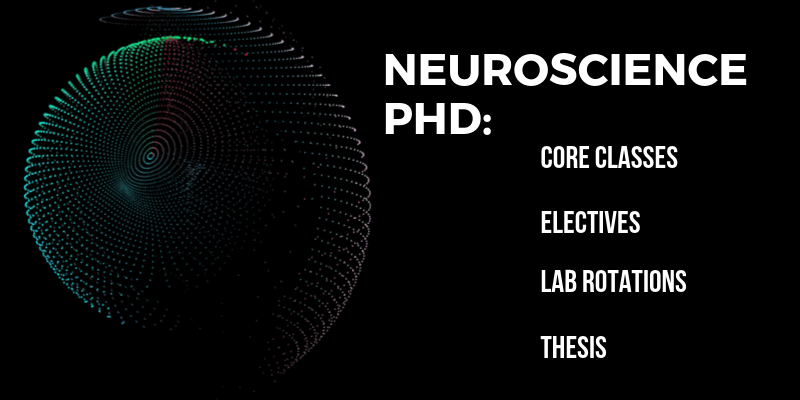
Lecture-based classes teach students about the fundamentals of neuroscience and the related fields that inform it, including mathematical modeling, pharmacology, cellular biology, data assay, AI, and genetics. The core curriculum of a neuroscience PhD will usually focus on iii areas: Cellular, Molecular, and Developmental Neuroscience; Computational and Systems Neuroscience; and Behavioral and Cognitive Neuroscience. Electives let students to specialize in a field of particular interest.
Neuroscience Laboratories teach neuroscience students how to apply neuroscience skills, and techniques of performing lab-based research. Rotations allow students to exercise choice in their setting and experience unlike types of neuroscience research, which tin can help them chose an area for their thesis research.
An Original Inquiry-Based Thesis takes place in the concluding years of a neuroscience PhD programme under the guidance of a designated departmental thesis advisor and Thesis Commission. The research should represent new findings in the field of neuroscience, and so will nigh certainly be in a very niche surface area of specialty. The results should lead to publication in a peer-reviewed scientific journal.
Students larn throughout their programme how to read, evaluate, and nowadays the most current scientific literature, and also develop and bear their ain original research. They may attend and nowadays at conferences such equally the American Academy of Neurology, the American Neurological Association, or the Society for Neuroscience. A typical Ph.D. program in neuroscience takes about iv-6 years to complete. Typically, neuroscience PhD graduates besides complete a lab-based postdoctoral fellowship for about 2 years before looking for work as a neuroscientist.
What Classes will I Take for a Degree in Neuroscience?
As we've discussed above, a available's in neuroscience will provide a foundation in the principles of science and math that inform the field of neuroscience, too as classes specific to the major. These core requirements will comprehend classes like:
- Calculus
- Organic Chemistry
- Physics for Life Sciences
- Statistics
- Psychology
- Reckoner Programming
At the undergraduate level, you lot can expect to have neuroscience classes that comprehend the broad foundations of the field, and so that you can have a bones understanding about all the master areas of neuroscience and aware of electric current inquiry. You'll too be able to accept a few electives in an surface area of particular interest. Typical undergraduate neuroscience classes include:
- Systems Neuroscience
- Neurobiology
- Cognitive neuroscience
- Neural Development
- Neurological Disorders
- Neurogenetics
- Artificial Intelligence
- Psychobiology
For a master'southward or PhD in neuroscience, you'll be taking graduate level neuroscience classes besides as electives in fields like computer programming and electrical engineering science. These volition have advanced and very specific subjects, so y'all can develop a greater understanding of the different areas of neuroscience, and deep expertise in the area of your focus. This will exist essential for informing your thesis research and forming the basis of your neuroscience career, which is likely to focus on a detail surface area. Typical graduate neurotic since classes include:
- Advanced Topics in Systems Neuroscience
- Neural Computation
- Functional MRI Methods
- Visual Cognitive Neuroscience
- Cellular, Molecular & Developmental Neuroscience
- Neural Basis of Human Movement
- Encephalon Architecture
- Neuroplasticity and Neural Repair
- Computational Neuroengineering
Where Tin can I Piece of work with a Neuroscience Caste?
While neurologists work in clinical settings, seeing patients, and overseeing medical interventions, neuroscientists are usually responsible for scientific enquiry. They may spend their time gathering data in the field, running empirical experiments in the lab, and analyzing data in an office. They are also responsible for authoritative tasks related to enquiry, such as managing facilities, overseeing teams, presenting to peers, reviewing and writing for neuroscience journals, drafting research grants, and addressing the general public.
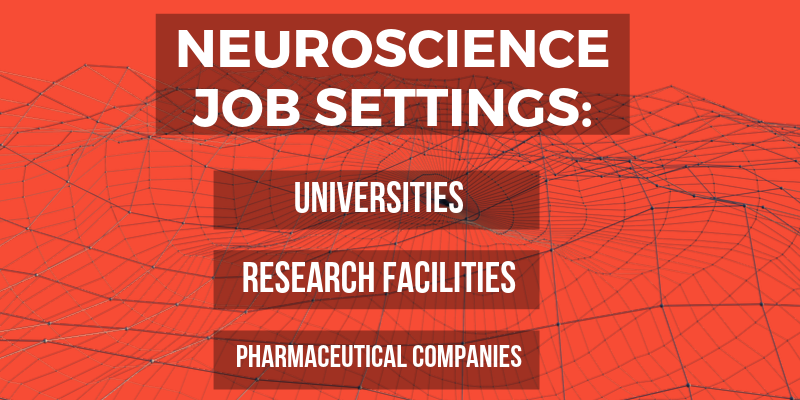
Your job duties may vary somewhat based on your job setting. For instance, university-based researchers are expected to regularly publish their findings in peer-reviewed journals, mentor students, and serve on committees. Researchers in government institutes may need to spend more than time discussing research applications and communicating their findings to the public. Some of the most mutual job settings for neuroscientists are:
Pharmaceutical Companies such as those that make drugs to care for the symptoms of depression, schizophrenia, and ADHD. These companies want to understand how effectively their drugs work, how safe they are, and find new, improve, and cheaper pharmaceuticals to treat brain and nervous system conditions.
Biotech Companies such as those that brand drugs to treat multiple sclerosis (MS), ALS, and Alzheimer's through stem cell therapy, electroceuticals, and other biological processes. Biotech companies are also pioneering techniques for imaging, modeling, and developing brain implants. This is a quickly-evolving field, with potentially lucrative salaries.
Regime Institutes such equally the National Institutes of Health (NIH), Environmental Protection Agency (EPA), and the Nutrient and Drug Assistants (FDA). Neuroscientists working for government institutes take the potential to amend many lives by shaping policy with their findings. Problems like the public impact of addiction and the best handling for combat-related PTSD are particularly important to neuroscientists at government institutes.
Universities including both public and private schools use many neuroscientists as professors and researchers. Tenured neuroscience professors have a lot of mental attitude in their inquiry, and are able to choose the topics and methods that interest them well-nigh to explore. They are too expected to instruct, supervise, and mentor students, to source funding, to perform bookish departmental duties, and to regularly publish in peer-reviewed journals.
What is the Chore Market place with a Neuroscience Degree?
This is an excellent time to become a neuroscientist. An crumbling population, increased incidence of chronic diseases, ascension rates of habit and other disorders, a growing reliance on pharmaceuticals all mean that demand for neuroscientists is on the ascension. And if you intendance deeply about breaking new ground, you tin can detect a place in cut-edge fields like optogenetics, electroceuticals, and deep neural imaging, where the pace of innovation is fast and ever accelerating.
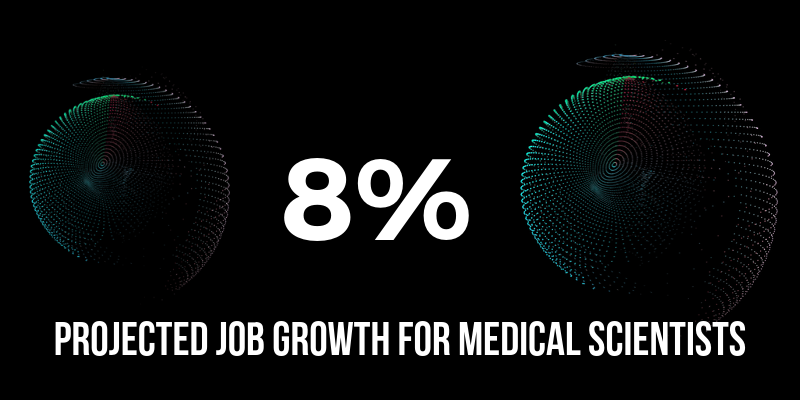
Footling data is available on the specific job market for neuroscientists, in office considering the role involves so many different job functions and task titles (such as pb researcher, neuroanatomist, computational neuroscientist, professor of neurobiology etc.). But the Agency of Labor Statistics (BLS) has reported on the job market for medical scientists (a task category that includes neuroscientists, neurologists, and clinical medical researchers), and the outlook is adept. The BLS has projected that jobs for medical scientists volition grow past 8% from 2018 -2028, a faster rate than the national boilerplate for all occupations. And given the factors mentioned to a higher place that chronicle specifically to brain health, it'south likely that the rate for neuroscientists, in particular, will even exist a flake higher.
About people who choose a neuroscience degree do so because they want to break new ground, push button the limits of human agreement, and have a positive bear on on the world. But a neuroscience degree means a good salary equally well equally rewarding piece of work. The BLS reports that the overall average salary for medical scientists was $84,810 in 2018. Medical scientists working for pharmaceutical and medical manufacturing companies fared even better, earning $115,450 on average. Those who performed inquiry and evolution earned $90,910. Since well-nigh neuroscientists work in one of these two areas, it's likely that the overall average salary for neuroscientists (as opposed to medical scientists in general) is closer to $100,000. ZipRecruiter'southward data aligns with this estimate; they report that the average salary for a neuroscientist is $115,833 annually.
Further Reading:
- What Tin I Exercise With a Degree in Science?
- What Bachelor's Degree do I need to piece of work in Neuroscience?
- What is the Degree Procedure for a Career in Inquiry Psychology?
- How Avant-garde a Caste exercise I need in Neuroscience?
- What caste do I need to be a Cerebral Neuroscientist?
- How Much Science is there in a Available'south Caste in Neuroscience?
- Top ten Highest Paying Science Careers
- What Is the Benefit of an Technology Caste Vs a Science Degree?
- What Can I Do with a Chemistry Degree?
- What is the Difference between a Ph.D. in Psychology and PsyD?
- What Can I Do with a Doctoral Caste?
- Meridian 10 Paying Healthcare Jobs without an G.D.
- Top twenty In-Demand Healthcare Careers
- What Can I do with a Degree in Medicine?
- What Can I do with a Degree in Psychology?
- l All-time Online Degrees for 2019
- 20 All-time Degree Programs for Undergraduates
desjardinscrent1944.blogspot.com
Source: https://www.degreequery.com/neuroscience-degrees/
Post a Comment for "what to do with a cognitive science major"